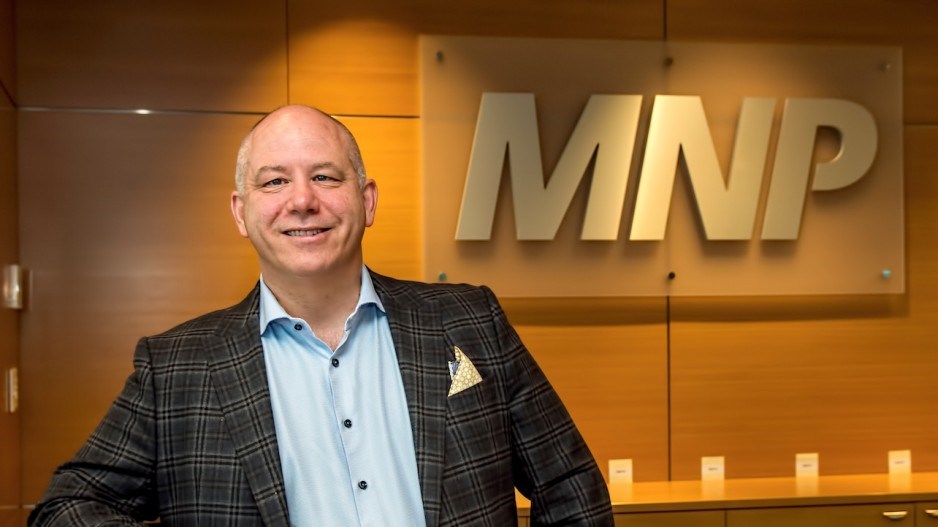Large accounting firms are adapting to a new post-pandemic normal that includes strategic shifts and operational adjustments.
When KPMG LLP started allowing unvaccinated employees to return to the office on June 15, it ended its status as one of the only large accounting firms that still banned those workers from offices. Deloitte LLP started allowing unvaccinated employees back to the office on March 21; PwC Canada and MNP LLP followed suit in April.
When COVID-19 arrived in March 2020, firms told staff to work remotely.
Today, most accountants and related staff work hybrid schedules with some time in the office but most time at home, in clients’ offices or elsewhere. Managing partners of large Vancouver accounting firms told BIV that they expect this situation to continue.
About 25 per cent of Deloitte’s Vancouver staff are in the office daily, estimated the firm’s regional managing partner, Jodi Evans. About 10 per cent of its workers never come to the office while approximately 65 per cent come in an average of one to two days per week, she told BIV.
"We are not saying our people should be in two days a week, or three days a week, or four days a week – unless there are certain roles," she said. "For our accountants, or our professional-services staff, we're anticipating more like two to three days per week."
KPMG regional managing partner Walter Pela, MNP LLP regional managing partner Darren Turchansky and PwC Canada’s B.C. regional managing partner Jim McGuigan each separately told BIV that the “vast majority” of their workforces have hybrid schedules, that about 10 per cent of staff are in the office every day and that working entirely remotely is possible, but rare.
KPMG offers employees the ability to work remotely outside of their home province for up to eight weeks per year, with four of those weeks allowed to be outside Canada. They are also allowed to work four-day work weeks for full-time pay during the summer, Pela said.
Fewer employees in offices means firms need less office space. Deloitte moved into a new, larger space at 410 West Georgia Street in June, but other firms are not so sure about how much office space they will need in future.
“It’s a bit of an unknown,” Turchansky said. “We’re certainly looking at what we see the future being for our space needs.”
Because hybrid work has blurred the line between work and home routines, firms have started to draft right-to-disconnect policies that aim to guarantee that workers do not burn out by feeling compelled to respond to emails or other work communication outside of working hours.
An Ontario law took effect June 2 that requires companies with more than 25 employees to have written policies stating that employees can disconnect from work outside of business hours.
Most large accounting firm managing partners told BIV that the law does not affect them much because they have long had informal policies allowing employees to disconnect outside of work time.
Workers can tailor their own flexible schedules, but firm partners expect them to provide quality and timely service to clients.
"We have adopted a disconnecting-from-work policy that is national in scope," Pela said.
"It will provide instructions to enable any KPMG Canada employee to minimize interruptions for, basically, approved time off, that's caused by emails and work related communication."
Unlike KPMG, firms such as MNP are abiding by a written policy for disconnecting from work in Ontario, but the policy has not yet been expanded countrywide.
"We know that Quebec and B.C. are looking at similar legislation, so we would use a similar policy," Turchansky said.
Video-conferencing software from Zoom Communications Inc. (Nasdaq:ZM) and Microsoft Corp. (Nasdaq:MSFT) proliferated during the pandemic, as firms increasingly held virtual meetings.
Technological advances mean some meetings have started to be held in the metaverse, where participants wear headsets and have three-dimensional avatars that can shake hands with each other, Pela said.
He noted that his firm's digital executive team piloted technology that uses augmented and virtual reality.
These advances mean business travel is a fraction of what it was before COVID-19 disrupted work-life norms.
Managing partners say they expect staff will continue to travel less than they did pre-pandemic.
"We're not traveling as much for a number of reasons," McGuigan said. "No. 1, we've learned that we can conduct a lot of meetings remotely, and virtually, and we can be very effective. The second reason is we're conscious of our environmental footprint." •




